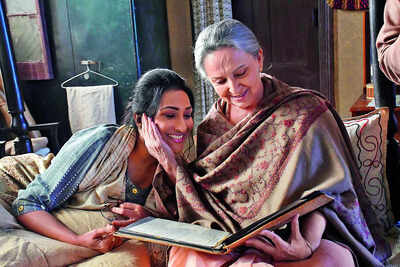- News
- entertainment
- bengali
- movies
- Why Tollywood clings to veterans for that elusive success: A revival at twilight
Trending
Why Tollywood clings to veterans for that elusive success: A revival at twilight
Bengali cinema is experiencing a surge in narratives centered around the elderly, moving beyond a trend to a recognized genre. Films like Belaseshe paved the way, inspiring more stories exploring aging, loneliness, and familial bonds. Veteran actors are being cast in lead roles, resonating with audiences and sparking conversations about aging and empathy.
In April-May 2025, big screens in Bengal witnessed three films released with veteran stars as protagonists — Sharmila Tagore in Puratawn, Mousumi Chatterjee in Aariiand an upcoming release starring Rakhee Gulzar. This isn’t a 2025 phenomenon. Over the past decade, Bengali cinema has increasingly embraced narratives centered around the elderly — a thematic shift that has now gone beyond a ‘trend’, with broader societal recognition of the complexities faced by the elderly.
Operation Sindoor
Thematic thread
From the 1960sto the 80s, Bengali cinema, especially under the influence of auteurs like Satyajit Ray, Tapan Sinha and Ritwik Ghatak, occasionally placed senior citizens at the narrative centre. While earlier films like Jalsaghar (1958) and Bancharamer Bagan (1980) touched upon the lives of the elderly, a significant shift occurred in the mid-2010s. Films such as Belaseshe (2015) and Mayurakshi (2017) brought senior characters to the forefront, delving into their emotional landscapes, exploring themes of ageing, loneliness, familial bonds, and rediscovery. The concerted focus on senior-centric narratives has solidified over the past 10 years, indicating a sustained and growing audience interest in such stories.Significant cultural shift
The film widely credited with marking this cultural shift is Belaseshe (2015), directed by Shiboprosad Mukherjee and Nandita Roy. It broke several norms. The portrayal of senior citizens as protagonists with their own agency was the first. The film went on to become a major commercial and critical success, proving there was a sizable audience for emotionally rich stories about the elderly. Producers came forward to fund more films on intergenerational narratives – and it has been working, thus far. In its wake, arguably, Belaseshe inspired a series of similar films, from Mayurakshi (2017) to Shonar Pahar (2018) to Gotro (2019). This focus has continued into recent years, with movies like Tonic(2021), Ei Raat Tomar Amaar (2024), Puratawn (2025) and Aarii (2025) further exploring the intricacies ofelderly experiences.
Soumitra Chatterjee and Swatilekha Sengupta in Belaseshe
A Question of Commerce
“Films featuring senior actors often reflect Bengali culture and heritage, which resonates strongly with audiences with a deep affection. The audience’s long-term relationship usually means that such films tend to perform well at the box office,” explained Joydeep Mukherjee, owner, Binodini (formerly Star) Theatre.Mukherjee was quick to point out that simply casting experienced actors isn’t enough – a compelling storyline is essential to draw audiences to theatres. “Problems arise when filmmakers follow trends and cast senior actors in roles that don’t align their image or the storyline. If the character isn’t justified within the narrative, it simply doesn’t work,” Mukherjee said. Arijit Dutta of Priya Cinema spoke on “phases” witnessed by the industry over decades – “There was a phase when only action films did well at the box office. A similar phase happened with horror films. Now, elderly actors are playing pivotal characters in a film – and films like Tonic have done well at the box office,” Dutta said. 
Mousumi Chatterjee and Yash Daasguptaa in Aarii

Paran Bandyopadhyay and Dev in Tonic
Why it works? One word – relatability
Bengal has the second-highest proportion of elderly women living alone, after Tamil Nadu. Narratives on loneliness are a reflection of our immediate reality. These are relatable stories – told by bankable stars, set against a familiar, Bangali mise-en-scene.Rituparna Sengupta, who acted in and produced Suman Ghosh’s Puratawn – the film that marked Sharmila Tagore’s Tollywood return after a 14-year hiatus – spoke on how the core idea of the film was “to craft a thought-provoking story centred on the relationship between a mother and her daughter”.Filmmaker Atanu Ghosh, who had cast Soumitra Chatterjee as the protagonist in Mayurakshi, emphasised the finesse in performance from veteran actors as a game-changer. “Actors like Soumitra Chatterjee, and Supriya Devi have an unmatched understanding of character-building and emotional nuances. Most viewers have a long personal history with them, and that can deepen a film’s emotional resonance,” said Ghosh.Avijit Sen, director of films like Tonic, Projapoti, and Pradhan, emphasised how the stories call for “experienced actors” – like Paran Bandyopadhyay, Mithun Chakraborty and Mamata Shankar. “Veteran actors not only bring depth and quality to their performances but also enrich the entire team with their vast experience,” Sen added.
Sharmila Tagore in Puratawn
Tollywood’s tryst with the elderly
The most important outtake has been the initiation of mainstream conversations on ageing. Like Chhabi Biswas’s aging aristocrat in the throes of declining feudalism in Jalsaghar gave rise to discussions on cultural preservation in an era of changes, Tollywood’s new tryst with the elderly could give rise to better awareness on the struggles of old age in a world where empathy is diminishing by the hour. It is heartening to witness Indian cinema evolving in a way that celebrates experience, maturity and timeless talent – Mousumi ChatterjeeAarii would not have been possible without Mousumi Chatterjee. She could relate to the character– Nussrat JahanCharacters in film could be a part of our everyday reality – but audiences in a theatre want something beyond that. They want to see dreams being fulfilled, a story where the everyday man wins. A film that offers that will be well-received– Paran BandyopadhyayCheck out our list of the latest Hindi, English, Tamil, Telugu, Malayalam, and Kannada movies. And don’t miss our picks for the best Hindi movies, best Tamil movies, and best Telugu films.
End of Article
Follow Us On Social Media
Visual Stories
Tired of too many ads?










